Small obsession with queer lotr, queer fanfic 🌈 queer-coded art, Brit lit, #queerTolkien, Good Omens, queer history, fanfic writing, fan art, Academic Tolkien
Don't wanna be here? Send us removal request.
Text
thinking about the second coming and the jesus/judas parallels...
you're the nice one. here's your friend. best friend even. and you love him even as you worry you're doomed. and now they're here to take you away. he comes up to you. he kisses you. its a kiss that condemns you but nevertheless you forgive him. you give up everything for humanity. and you do it all with a smile! you turn the other cheek!
you're the evil one. you have to do the dirty work so heaven doesn't have blood on its hands. maybe one day humanity will be grateful to you for what you gave them but for now it's a thankless job. you never wanted any of this but here's your part in the great plan. here's your friend. best friend even. you kiss him. they take him away and you are alone.
#good omens#jesus christ superstar#because yeah this tracks#good omens meta#to clarify i dont think anything crowley did was a betrayal#but i do think aziraphale took it as such#its like. i offered you eternity and safety and happiness. i thought itd be enough. arent i enough? must you betray me with a kiss?#good omens analysis
151 notes
·
View notes
Text
This is just a stray thought for now. It might turn into something more later. We do a lot of deep analysis on Aziraphale's relationship to heaven, and the push and pull it has on him, and how he sees himself in relation to it. We typically contrast that with how Crowley broke from heaven. But heaven and hell are two different levels of the same organization.
As I have mentioned before, Crowley's fall from heaven isn't what got him to being on his own side. It's his separation from hell too that got him there. I think there is a lot to say about Crowley's relationship to hell that's been getting lost when the focus is so heavily on comparing how Aziraphale and Crowley experienced separation from heaven specifically.
351 notes
·
View notes
Text

A secret tryst in Rome 41 ad.
A mild NSFW piece I created for my friend @vavoom-sorted-art. She requested this scene and I couldn't help but say yes!
Support me as an artist here: https://ko-fi.com/beanart
#jaysus this is hot#Crowley riding aziraphale#good omens#good omens fanart#good omens art#ineffable husbands#that hand#Crowley’s arse#very nice
5K notes
·
View notes
Text
I often see posts about curating your own online experience that make the point, “content creators aren’t your parents.” And, yes, that is absolutely true! And I try not to be like “as a parent,“ but as a parent…
EVEN PARENTS ARE SUPPOSED TO ENCOURAGE RESPONSIBLE READING/VIEWING BEHAVIOR. NOT filter everything ahead of time for their kid.
When my kiddo was 5, his pediatrician was asking him the usual Well Child Visit questions (“What are your favorite foods? What do you do to get your body moving? Do you know what to do if you get lost in a public place?” Etc.) and she asked, “What do you do if you see something on TV that scares or upsets you?”
I piped up like, “Oh, he doesn’t watch TV without one of us in the room,” which was true at the time and is still largely true now. She said, “Yes, but that won’t always be the case, so make sure you’re talking to him about what to do if he sees something that upsets him.”
So we started talking to him about that, and the answer is simple: “Turn it off or leave the room, and talk to someone you trust about what you saw and what you’re feeling.”
The answer is NOT “Ask your parents to make sure you never see anything upsetting again,” because that’s just not possible — and ultimately that would be doing the kid a disservice, since sooner or later he’s going to be out in the world where we can’t control what he watches or reads. That doesn’t mean we don’t try to make sure he’s watching/reading age-appropriate stuff, it just means that’s not the only safeguard he has — and that’s a good thing.
So yes, content creators aren’t your parents and aren’t responsible for making sure you never see anything you don’t like — but also, your own parents should have taught you what to do when that happens. So if they didn’t, take it from me, your internet mom:
Turn it off.
Walk away.
Talk to someone you trust about how you’re feeling.
And leave the person who created the thing that upset you alone.
#actually good parenting advice#don’t like don’t read#don’t like don’t watch#curate your experience#and let creators create#daddy Gaiman knows best
58K notes
·
View notes
Text
Awhile ago @ouidamforeman made this post:
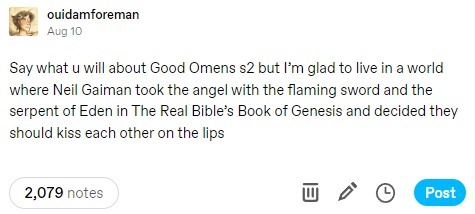
This shot through my brain like a chain of firecrackers, so, without derailing the original post, I have some THOUGHTS to add about why this concept is not only hilarious (because it is), but also...
It. It kind of fucks. Severely.
And in a delightfully Pratchett-y way, I'd dare to suggest.
I'll explain:
As inferred above, both Crowley AND Aziraphale have canonical Biblical counterparts. Not by name, no, but by function.
Crowley, of course, is the serpent of Eden.
(note on the serpent of Eden: In Genesis 3:1-15, at least, the serpent is not identified as anything other than a serpent, albeit one that can talk. Later, it will be variously interpreted as a traitorous agent of Hell, as a demon, as a guise of Satan himself, etc. In Good Omens --as a slinky ginger who walks funny)
Lesser known, at least so far as I can tell, is the flaming sword. It, too, appears in Genesis 3, in the very last line:
"So he drove out the man; and placed at the east of the garden of Eden Cherubims, and a flaming sword which turned every way, to keep the way of the tree of life." --Genesis 3:24, KJV
Thanks to translation ambiguity, there is some debate concerning the nature of the flaming sword --is it a divine weapon given unto one of the Cherubim (if so, why only one)? Or is it an independent entity, which takes the form of a sword (as other angelic beings take the form of wheels and such)? For our purposes, I don't think the distinction matters. The guard at the gate of Eden, whether an angel wielding the sword or an angel who IS the sword, is Aziraphale.
(note on the flaming sword: in some traditions --Eastern Orthodox, for example-- it is held that upon Christ's death and resurrection, the flaming sword gave up it's post and vanished from Eden for good. By these sensibilities, the removal of the sword signifies the redemption and salvation of man.
...Put a pin in that. We're coming back to it.)
So, we have our pair. The Serpent and the Sword, introduced at the beginning and the end (ha) of the very same chapter of Genesis.
But here's the important bit, the bit that's not immediately obvious, the bit that nonetheless encapsulates one of the central themes, if not THE central theme, of Good Omens:
The Sword was never intended to guard Eden while Adam and Eve were still in it.
Do you understand?
The Sword's function was never to protect them. It doesn't even appear until after they've already fallen. No... it was to usher Adam and Eve from the garden, and then keep them out. It was a threat. It was a punishment.
The flaming sword was given to be used against them.
So. Again. We have our pair. The Serpent and the Sword: the inception and the consequence of original sin, personified. They are the one-two punch that launches mankind from paradise, after Hell lures it to destruction and Heaven condemns it for being destroyed. Which is to say that despite being, supposedly, hereditary enemies on two different sides of a celestial cold war, they are actually unified by one purpose, one pivotal role to play in the Divine Plan: completely fucking humanity over.
That's how it's supposed to go. It is written.
...But, in Good Omens, they're not just the Serpent and the Sword.
They're Crowley and Aziraphale.
(author begins to go insane from emotion under the cut)
In Good Omens, humanity is handed it's salvation (pin!) scarcely half an hour after losing it. Instead of looming over God's empty garden, the sword protects a very sad, very scared and very pregnant girl. And no, not because a blameless martyr suffered and died for the privilege, either.
It was just that she'd had such a bad day. And there were vicious animals out there. And Aziraphale worried she would be cold.
...I need to impress upon you how much this is NOT just a matter of being careless with company property. With this one act of kindness, Aziraphale is undermining the whole entire POINT of the expulsion from Eden. God Herself confronts him about it, and he lies. To God.
And the Serpent--
(Crowley, that is, who wonders what's so bad about knowing the difference between good and evil anyway; who thinks that maybe he did a GOOD thing when he tempted Eve with the apple; who objects that God is over-reacting to a first offense; who knows what it is to fall but not what it is to be comforted after the fact...)
--just goes ahead and falls in love with him about it.
As for Crowley --I barely need to explain him, right? People have been making the 'didn't the serpent actually do us a solid?' argument for centuries. But if I'm going to quote one of them, it may as well be the one Neil Gaiman wrote ficlet about:
"If the account given in Genesis is really true, ought we not, after all, to thank this serpent? He was the first schoolmaster, the first advocate of learning, the first enemy of ignorance, the first to whisper in human ears the sacred word liberty, the creator of ambition, the author of modesty, of inquiry, of doubt, of investigation, of progress and of civilization." --Robert G. Ingersoll
The first to ask questions.
Even beyond flattering literary interpretation, we know that Crowley is, so often, discreetly running damage control on the machinations of Heaven and Hell. When he can get away with it. Occasionally, when he can't (1827).
And Aziraphale loves him for it, too. Loves him back.
And so this romance plays out over millennia, where they fall in love with each other but also the world, because of each other and because of the world. But it begins in Eden. Where, instead of acting as the first Earthly example of Divine/Diabolical collusion and callousness--
(other examples --the flood; the bet with Satan; the back channels; the exchange of Holy Water and Hellfire; and on and on...)
--they refuse. Without even necessarily knowing they're doing it, they just refuse. Refuse to trivialize human life, and refuse to hate each other.
To write a story about the Serpent and the Sword falling in love is to write a story about transgression.
Not just in the sense that they are a demon and an angel, and it's ~forbidden. That's part of it, yeah, but the greater part of it is that they are THIS demon and angel, in particular. From The Real Bible's Book of Genesis, in the chapter where man falls.
It's the sort of thing you write and laugh. And then you look at it. And you think. And then you frown, and you sit up a little straighter. And you think.
And then you keep writing.
And what emerges hits you like a goddamn truck.
(...A lot of Pratchett reads that way. I believe Gaiman when he says Pratchett would have been happy with the romance, by the way. I really really do).
It's a story about transgression, about love as transgression. They break the rules by loving each other, by loving creation, and by rejecting the hatred and hypocrisy that would have triangulated them as a unified blow against humanity, before humanity had even really got started. And yeah, hell, it's a queer romance too, just to really drive the point home (oh, that!!! THAT!!!)
...I could spend a long time wildly gesturing at this and never be satisfied. Instead of watching me do that (I'll spare you), please look at this gif:
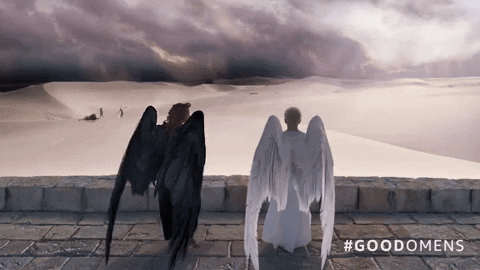
I love this shot so much.
Look at Eve and Crowley moving, at the same time in the same direction, towards their respective wielders of the flaming sword. Adam reaches out and takes her hand; Aziraphale reaches out and covers him with a wing.
You know what a shot like that establishes? Likeness. Commonality. Kinship.
"Our side" was never just Crowley and Aziraphale. Crowley says as much at the end of season 1 ("--all of us against all of them."). From the beginning, "our side" was Crowley, Aziraphale, and every single human being. Lately that's around 8 billion, but once upon a time it was just two other people. Another couple. The primeval mother and father.
But Adam and Eve die, eventually. Humanity grows without them. It's Crowley and Aziraphale who remain, and who protect it. Who...oversee it's upbringing.
Godfathers. Sort of.
#good omens#ineffable husbands#aziracrow#good omens 2#crowley#aziraphale#good omens meta#Adam and Aziraphale#Crowley and Eve#Best Good Omens Meta
27K notes
·
View notes
Text
On Aziraphale and “I’m soft”
I was talking with @irisbleufic about differences between show! and book!Aziraphale, and especially about the line “I’m soft” in the show, because it really threw me for a loop, but the reblog chain contracted some incredibly odd formatting, so this is a hopefully more-comprehensible version:
@imaginaryelle: random but re: Aziraphale’s show characterization vs book: I enjoy both, but they are so, so different in weird ways and when I rewatch the show I’m just left with dissonance & wondering WHY that change happened. The “I’m soft” line struck me the hardest, because I have literally never thought of Aziraphale as soft. Not emotionally. The closest to the book we got was maybe the french executioner? But then he just ignores the implication. The show version feels almost unfinished, as a character.
@irisbleufic: I mean, Aziraphale is physically soft, no question, but in any other sense? Whoa, nope. Not unless you count how soft he is for Crowley once he gets put through the wringer of a failed apocalypse and unlearns some of those rude, holier-than-thou tidbits he says to Crowley from time to time. I mean, he’s soft for Crowley before their ordeal, but the ordeal is what adjusts (and hopefully eradicates) his prejudice. I’ve always found the whole “I can’t expect you to know what love feels like” thing remarkably callous, and the fact that Crowley gets cut off before he can say what his perception of a great sense of love is like just…ugh, I’ve always loved that moment so, so much, because it’s quite a perfect encapsulation of this entire disconnect between book characterization / miniseries characterization that we’re talking about:
“Odd,” muttered the angel, “I keep getting these flashes of, of…” He raised his hands to his temples.“What? What?” said Crowley. Aziraphale stared at him.“Love,” he said. “Someone really loves this place.” “Pardon?” “There seems to be this great sense of love. I can’t put it any better than that. Especially not to you.” “Do you mean like—” Crowley began. There was a whirr, a scream, and a clunk. The car stopped. [Enter Anathema, etc.]
@imaginaryelle: Yes, yes, I love that moment too! Okay, it took a bit longer than I hoped but I finally got my thoughts in order on this, and it ended up way longer and more like an essay than I originally thought it would, but I really enjoyed playing with it so I hope you enjoy it too.
Yes, absolutely Aziraphale is physically soft. He’s even described exactly that way by Shadwell (“the soft one in the camelhair coat”), and it seems to be pretty clearly about his appearance and presentation. Shadwell thinks Aziraphale is gay, fastidious (tries not to touch anything in the WFA headquarters) and an easier mark than Crowley, though he still finds the idea of threatening him “terribly risky.” We also have Aziraphale’s plump hands in the gun conversation at Tadfield Manor and the Compline reference too. But those and the intelligent/English/gay footnote are actually the only description of him I can find in the text. The only reference to height is that snake!Crowley has to look up at him, but that doesn’t tell us much. Which was surprising to find, because I had thought there was a little more than that, but yes. Physically Aziraphale is soft and I love that about him.
On a non-physical level, yes, exactly, in the book Aziraphale is extremely callous. Quite often. It actually surprised me, going back through my notes, how rarely he’s portrayed as anything else, but I think it does overall build a picture of him that, to me, has always been pretty immovable. I’ve never really been able to set aside that Aziraphale is, as Crowley says, a bastard. And he’s fairly thoughtless about it a lot of the time. He’s offhandedly pretty harsh on Crowley on a number of occasions, most of which got really toned down in the show. There’s the conversation about love, yes, which got especially confused in the show (the presentation made it seem like Aziraphale was talking about the Manor rather than all of Tadfield and they didn’t follow up on it well, and then it’s further muddled by the stain-miracle interaction). I would love to read pretty much anything on the subject of what Crowley was going to say there and how things are different for demons, because mmmmm, world building, and of course I love Crowley too.
But back to Aziraphale: there’re other callous remarks to Crowley too. In their very first interaction we have this:
“Yes, but you’re a demon. I’m not sure if it’s actually possible for you to do good,” said Aziraphale. “It’s down to your basic, you know, nature. Nothing personal, you understand.”
And then, when Crowley keeps on with his “but what is it about, really” line of conversation:
“Best not to speculate, really,” said Aziraphale. “You can’t second-guess ineffability, I always say. There’s Right, and there’s Wrong. If you do Wrong when you’re told to do Right, you deserve to be punished. Er.”
Like, here, let me just rub your face in the Fall for a second. You can’t help your basic nature but also you deserve punishment. Ouch. (And this is not in the show. In the show he references Crowley’s being a demon as related to “[making trouble] is what you do” and has what looks like a pretty disturbing experience watching his gift of kindness result in the immediate death of a lion by flaming sword.)
It’s implied book!Aziraphale is embarrassed about having said that, but he doesn’t actually change his tune. He brings up the “you’re a demon” thing twice more, both in situations where it’s clear he thinks he has the moral high ground, because of course he does, he’s an angel. (book!Aziraphale is less openly doubtful of Heaven’s rightness until closer to the end, I think.) In contrast, throughout the show it’s often Crowley who reminds Aziraphale that he’s a demon, and thus not nice, not forgivable and not to be thanked while Aziraphale maintains that Crowley is a good person. For another example, book!Aziraphale, in the wake of failing to find records of Adam at the manor, has zero reaction to Crowley’s fear, and Crowley is pretty obviously freaking out:
“What are we going to do now?”
“Try and get some sleep.”
“You don’t need sleep. I don’t need sleep. Evil never sleeps, and Virtue is ever-vigilant.”
“Evil in general, maybe. This specific part of it has got into the habit of getting its head down occasionally.” [Crowley] stared into the headlights. The time would come soon enough when sleep would be right out of the question. When those Below found out that he, personally, had lost the Antichrist, they’d probably dig out all those reports he’d done on the Spanish Inquisition and try them out on him, one at a time and then all together.
He rummaged in the glove compartment, fumbled a tape at random, and slotted it into the player. A little music would …
… Bee-elzebub has a devil put aside for me, for me …
“For me,” murmured Crowley. His expression went blank for a moment. Then he gave a strangled scream and wrenched at the on-off knob.
“Of course, we might be able to get a human to find him,” said Aziraphale thoughtfully.
“What?” said Crowley, distractedly.
And shortly after this, of course, Aziraphale finds the Book and just leaves when Crowley’s trying to confirm they’re still on the same side. In the show, this interaction doesn’t even happen. Crowley’s annoyed that they can’t find anything, but he’s not scared, and Aziraphale’s idea about using human operatives and his discovery of the book are split across several scenes and a fair chunk of time passing. Tv!Crowley watches him go into his shop into a sort of confused way, where book!Crowley is “feeling very alone” after not getting a real answer to two questions in a row.
Keep reading
77 notes
·
View notes
Text
I've seen some discussion of how Good Omens is an end-of-the-Cold-War novel, and I've done some Holding Forth myself on how and on what level Show Omens is a queer story and a satire/excoriation of Christianity's central values of authoritarianism and unquestioning obedience, but there's an aspect of of Good Omens that I haven't seen mentioned among the Ineffables yet, which is that Good Omens is a story about two characters coded as English men. It is, to some degree, a story about English masculinity.
We can say this with confidence because 1) the place Aziraphale and Crowley have been quietly going native for the last 1,500 years or so is England (Wessex and later London); and 2) Michael Sheen is audibly Welsh and David Tennant is audibly Scottish, and they have both adopted English accents for their roles.
There's some Word of God on this, too:
and
The accents are a choice. That means the Englishness is deliberate.
Obviously the masculinity is as well, in that Sheen and Tennant are both male and Aziraphale and Crowley default to male-coded for most of the story. And it's English masculinity, English Christianity, and the Cold War spy novel in combination that create the inescapable silence and terrible fear in which Crowley and Aziraphale must exist.
It's not just the eternal warmongering police state and bureaucracy, it's not just that God's left her angels to go feral like pigeons, it's also that Crowley and Aziraphale are coded as English men, and that combination means 1) they do not talk about feelings, ever

My man(-shaped entity) physically cannot say feelings words

David Tennant literally gives Crowley that English stiff upper lip.
and 2) They are a nationality and gender of people who touch and are touched among the least in the world. Like there is research on this, and I read that research in the 90s in a book first published in the 70s, I mean it is not news.
It took 6,000 years and one Armageddon for our beloved, mostly male-coded entities to get to this point--

--and they're both still clearly having a moment about it.
An essay exploring the different English masculinities presented and alluded to in Good Omens--and especially how English masculinity has always had space in it for same-sex love amongst the upper and artistic classes--would be super interesting, but I am not qualified to write it either in terms of depth and specificity of historical knowledge or in terms of my position in the human diversity/power dynamics web (cis bi woman).
#good omens#good omens s2#good omens english masculinity#good omens analysis#queer history#good omens meta
341 notes
·
View notes
Note
hello! i adore the work you are doing to spread more awareness about our lgbtq+ history ❤️ what is a foundational queer rights moment that you wish more non-lgbt folks/allies knew about?
Thank you so much! I am so glad that I have the opportunity to share queer history! I have been thinking for a minute about how to answer this question because there are so many possible answers. I first thought was I wish people knew more about The Institute of Sexology because it plays a big role in how we linguistically understand queerness today. Then I realized that this is true in Europe and much of North America, but there are a lot of places in the world where that isn't the case.
My second thought was The Golden Orchid Society because I feel it has much to teach in terms of queer history outside of Eurocentric terms, but I knew this wasn't quite the right answer. Then I thought of a guest article that was written: Brazilian Dictatorship and the Queer Movement, and then Simon Tseko Nkoli and Joël Gustave Nana Ngongang came to mind.
Around this point, I realized there is not one simple answer to this very good question. What I truly wish is that people had more knowledge and access to knowledge about the queer history of their region. I have gotten messages from people around the globe asking for information about their countries, sometimes, I have had answers, but all too often, I haven't.
It may be a bit of an obvious thing to say when your job is spreading queer history, but I wish the spread of queer history was even worldwide. I have found that there is no place on earth where queerness has no history of existing, but I have also found that certain narratives find themselves at the forefront of conversations again and again. There is so much depth and nuance that is missing from the global discussion of queerness due to a lack of information collected in local communities. It should not be as hard as it currently is to find queer ancestors from your region. This lack of access to resources is one of the biggest tragedies I face in my work, and I hope one day, it is something that people take more seriously.
#queer history#lgbt#queer#lgbt history#gay history#lesbian history#transgender history#making queer history
775 notes
·
View notes
Text
CORRECTED & UPDATED! Clothes + Equivocation = Romance:
The Husbands in 1793
EDIT: I made a significant error when I wrote this. As @goodjomans kindly points out in the comments to Part 2 of this essay (massive shoutout for this, goodjomans! also I love your name!), Aziraphale is the one who dresses the executioner in clothing like Aziraphale's original ensemble, not Crowley. This changes my conclusions about the meaning we can take from this scene!
On the one hand, mea culpa, y'all. I shall get on with eating my crow. On the other hand, I had to go through this frame-by-frame to catch which of the ineffable spouses puts Jean-Claude in his new togs, and the answer only lasts three frames. Here it is:
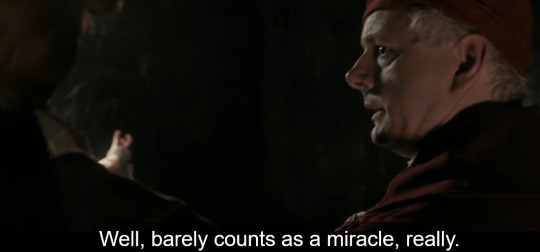
After Aziraphale changes his clothes, but before Crowley snaps his fingers and unfreezes time, there's a shot of the executioner over Crowley's shoulder, and he is now wearing a light coat with gold embroidery on the shoulders like Aziraphale's. Aziraphale arranges the executioner's death, not Crowley. So I feel like an idiot for missing it, but not a total idiot.
Let's discuss how this information changes what we can read from this scene! I'm going to leave my original text in place and edit with bold green. I can still stand by most of this essay, but this detail changes how I read the meaning of the husbands' communication at the end of this scene.
So we're all clear on the fact that the universe of Good Omens is an inescapable nightmare dystopia in which either of the husbands' merciless authoritarian regimes could be watching or listening to them at any time, yes? And that if either are caught 'fraternizing' with the other that means discorporation, torture, memory wipe, and/or death for either or both of them, yes?
Which means Crowley and Aziraphale can never speak or do anything openly to each other about their friendship or attraction or love. Everything they say and do has to have an innocuous meaning they can point to in case anybody ever sees or hears something Team Azcrow can't explain away. Walls (and ducks) have ears, and the price of slipping up--as we see in 1827--is heavy.
When a character says or does something that has two distinct meanings because they need to disguise what they really mean from one party but make their meaning plain to another, lit-nerds (and lit nerds🍃) call this equivocation. Equivocation is a kind of coded communication meant to pass hostile ears and eyes in plain sight but reach its intended recipient with its true meaning. The 1793 scene is jammed with it.
A lot of that coded messaging revolves around the clothes Crowley and Aziraphale choose in this scene, so--THESIS PARAGRAPH, BITCHES--we're going going to talk about how their clothes read to the people of this time period and location, what their clothes tell us about their characters, how their clothes help them equivocate, and what they're really saying with that equivocation. And Spoiler A-fucking-lert, it is ROMANTIC AF PRETTY GD ROMANTIC. Let's get nerdy!
We start with Aziraphale's beautiful champagne-gold and powder-pink ensemble.
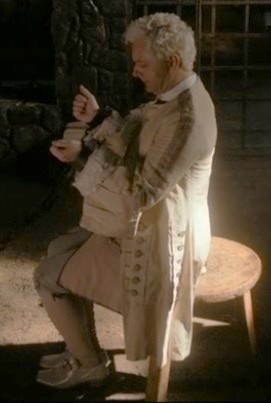
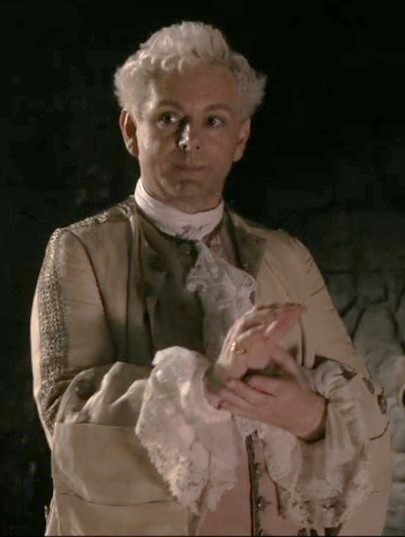
This outfit would tell people of this time period 3 things about Aziraphale:
That he's insanely wealthy--These clothes would be silk, hand-embroidered with thread made with actual gold. Each individual garment could cost years' or even decades' worth of working-class wages and take a team of skilled artisans dozens to hundreds of hours to make.
That he's a fop--i.e., a man who loves fine clothes and dressing up and looking fancy. By the 1790s in England, once-fashionable foppishness was giving way to the Neoclassical 'Corinthian' style, and was considered effete. (Fun note: During this time period, effete did not automatically indicate gay, and pink was considered a masculine color, so while Az. is queering it up to the audience here, his clothes would not have read as gay or overtly effeminate to the other characters around him.)
Even though he's insanely wealthy, Aziraphale wears clothes that are decades out of fashion.
According to the Victoria & Albert Museum, "As the [18th] century progressed, the male silhouette slowly changed.[...] Coat skirts gradually became less full and the front was cut in a curved line towards the back. Waistcoats became shorter. The upper leg began to show more and more[...]. Shoes became low-heeled with pointed toes and were fastened with a detachable buckle and straps or ribbon[.]
Source
That description is not what Aziraphale's wearing. Judging by his heel height and the length of his waistcoat, Aziraphale is wearing a style that's at least a decade older than this:
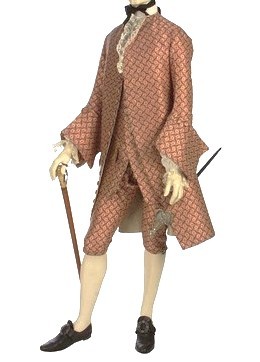
And this is from 1765. The great crepes caper happens in 1793, almost 30 years later.
My inference: Just as he has in the modern period, Aziraphale has settled into a style he really likes and refused to let go of it long after it's gone out of fashion.
We'll come back to this set of Aziraphale's clothes in a bit, but we need to talk about Crowley's first, because Crowley's clothes in this scene help render a line he says later about this outfit very flirtatious and darkly romantic.
First, some background: What was considered acceptable attire for wealthy people in France changed pretty much overnight during the French Revolution after the storming of the Bastille in 1789 and the fall of the French monarchy. Instead of advertising wealth, clothes now had to advertise political allegiance, and they had to do so loud and clear. And if you didn't want to be murdered by the French First Republic, that political allegiance had fucking better be to the Revolution.
People started wearing a looooooot of super patriotic shit. And I mean it was like little kids on the 4th of July; clothes were red, white, and blue in any hue and garish combination and print. The cockade, a fabric rosette in the colors of the French flag, was required by law to be worn by men, and despite that was just as popular among women. To show solidarity with the laboring classes, the fabrics the wealthy wore went from embroidered silk in light Rococo colors (what Aziraphale is wearing) to sober neutrals without decoration in wool, cotton, and linen.
Now, the script note for Crowley's clothing in this scene is this:

But clearly there were some changes made between script and filming, because Crowley does not appear standing behind Aziraphale; he appears lounging.
And he's not dressed as a French peasant.
Here's how French peasants dressed in 1790:
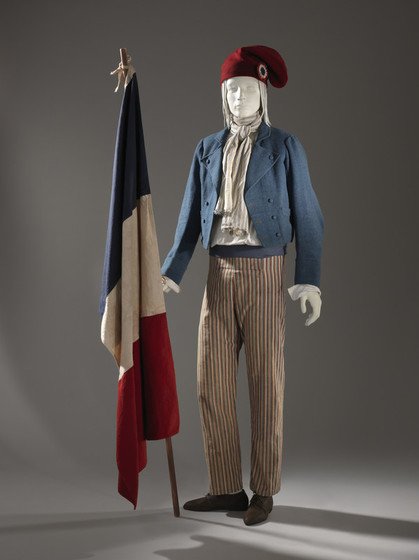
Peasants at this time wore styles that distinguished them from the styles of the upper classes not just in materials, colors, or patterns, but in shapes. Full trousers and cropped boxy jackets in French flag colors were the marks of the laboring-class Revolutionary, and both styles were huge changes from hundreds of years of French fashion up to that point.
And that's not what Crowley shows up wearing. Crowley is wearing the knee breeches, stockings, waistcoat, and frock coat of a wealthy man, and in fact his clothes reference a very specific type of wealthy man.
In the 1790s, if you were an aristocrat who wasn't happy about the Revolution and you were so sure of your privilege that you would risk your life showing it, you wore black in mourning for the monarchy and in protest of the violence of its deposition. If you were an aristocrat who wanted to protest and you didn't want to be immediately murdered by the French First Republic, you wore a style called half-mourning, which was black with a colored coat.
Here's a picture from a 1790 fashion magazine of an aristocrat in half-mourning:
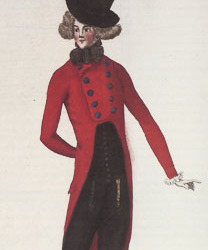
"The text accompanying the plate describes his ensemble as 'half-mourning,' referring to the aristocrats who lamented 'the diminished powers of the monarchy and [signaled] their willingness to die for the royal cause'" [emph. added]. [Source]
Notice: the shoes, stockings, breeches, waistcoat, and cravat are all black. You with me?
Because here's Crowley in 1793:
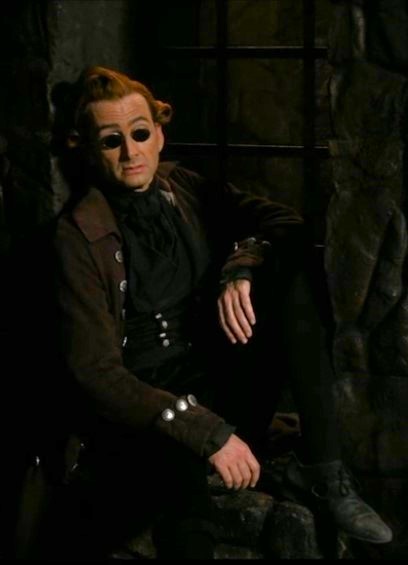
I've turned up the brightness and exposure in this image so he's more clearly visible against the stone, but I haven't warmed it up. He's wearing a coat that's a dark blackish red. Everything else, even his cravat, even his shirt, is black. (The black shirt is anachronistic, a lovely little nod to Crowley's refusal to wear angelic white.)
This is 179fuckin'3, y'all. Marie Antoinette is executed in 1793. It's 3 full years after that fashion plate up there in his bright red jacket, and that lil dude was already risking his neck way back in 1790. As we can see from the fact that the government are apparently now grabbing random wealthy-looking Englishmen off the street to murder without trial, the time for a man demon to be sauntering around Paris dressed in all black or even nearly all black is well past.
Crowley's also wearing a whole assload of huge silver buttons, which would have been flashy and tacky and frankly pretty weird in 1793 but very definitely an eccentric Rich Person Thing to do, bc regular buttons at this time were horn or wood and covered with the garment's fabric. The only man in France who could get away with this fancy aristo shit anymore was Robespierre himself, and only "devotion to the cause[...] excused Robespierre’s showy dress since he was perceived as a bridge between the politically empowered bourgeois deputies and the ardently antimonarchical unenfranchised classes." [Source]
So when Crowley teases Aziraphale--
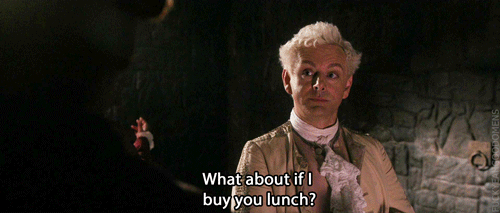
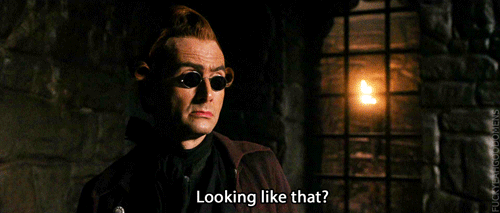
--both of them are perfectly well aware that Crowley's outfit would get him just as killed as Aziraphale's.
And that's why Aziraphale's expression is annoyed when he has abandon his "standards" and change his clothes. Because Aziraphale's the one who needs the favor, Crowley makes him take one for the team and wear the goofy hat.
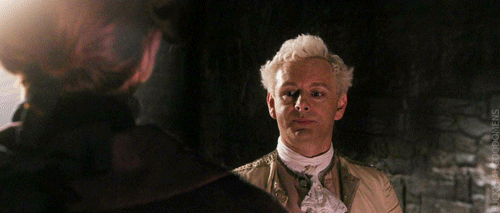
The clothes Az. changes into here tell people that he's rich, but also that he's a hardcore Revolutionary. The red jacket in a current cutaway style, the cockade and sash, and the bonnet phrygien (the red garden-gnome cap) all announce this guy is a huge supporter of the Revolution. His clothes are all still aristocratic in shape and materials (and he keeps his now-unfashionably frilly lace cravat), but he's no longer flaunting obscene wealth in a city filled with angry starving people, and the gnome cap says he's in solidarity with the working classes even if he isn't one of them.
Once he restarts time, Crowley is not leaving that prison cell safely without either changing his clothes or taking Aziraphale with him, because Crowley looks like a rich asshole protesting the fall of the monarchy--which is frankly exactly the kind of thing he'd show up wearing to the Bastille during the Reign of Terror (just like he wears athleisure in Heaven). But Aziraphale's new appearance covers for them both: if the rich-looking guy with no cockade and wearing all black under his almost-black jacket is in with this other guy who's obviously a Revolution fanatic, then the rich guy's probably okay, right? He just forgot his sash at home or something. Bees.
Something else happens when Az. changes, too. Look at Aziraphale's new dress from a different angle:
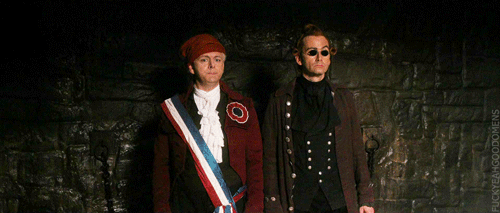
Half-mourning is a white shirt, but a black cravat, so this isn't half-mourning. He's wearing three different badges of the Revolution to make up for the fact that Crowley looks like a Satanic libertine (which tbf he is), but Aziraphale's new ensemble is black and dark red.
Y'all. Aziraphale changes into Crowley's colors.
Now, this is a more fashionable and higher quality version of what the executioner is wearing, so Aziraphale has very plausible deniability here; if anyone ever pulled him up on it, he could say he just copied our man Jean-Claude.
But let me show you what English fashion looks like right now:
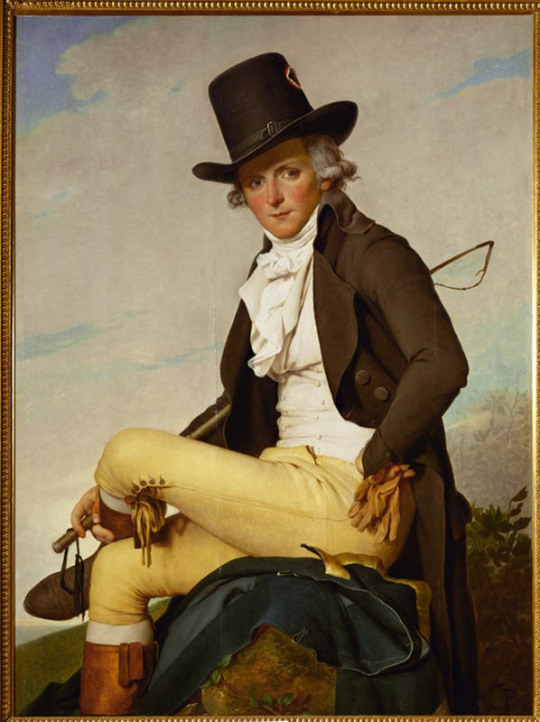
This is a French painting of a wealthy Frenchman, but he's wearing the English 'Corinthian' style. It was painted in 1795, so this would have been the very cutting edge of fashion in England in 1793, and the fabrics and colors look right at home in Revolutionary Paris. (He's wearing the cockade on his hat, btw.)
Look at all that angelic white! The buttery almond of the buckskin breeches, the golden kidskin gloves, the rich tan of the riding boots! The blue of the greatcoat! All colors we know Aziraphale prefers!
And yet this is what Aziraphale chooses:

We know from the entire rest of the show how very particular about his clothes Aziraphale is. And yet 150 years before he (accidentally) admits in words that he's Crowley's friend, Aziraphale wears Crowley's colors to take him to lunch to say thank you for a rescue.
When we decide whether a character's speech or action is equivocation, one of the things we check is whether equivocation (and deception generally) is something that character does elsewhere in the text, which, with Aziraphale, hahahahaha, DUH. He's already using equivocation in this scene.
The lunch date itself is equivocation on Aziraphale's part. Aziraphale tries to thank Crowley for the rescue, but Crowley says,
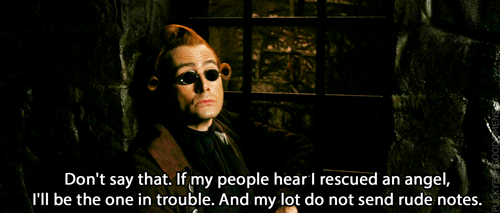
So Aziraphale says,

No more words like "thanks" or "rescue" used, but a couple hours of good food and drink and conversation, Aziraphale hopes, will express the gratitude toward Crowley it's not safe to speak aloud. With this, Crowley and Aziraphale explicitly establish that they are equivocating for each other's safety and using coded communication--immediately before Aziraphale changes into Crowley's colors.
So yes, Aziraphale may well copy the executioner's clothes. But consider: When a character who can't speak or act openly says or does something that has two or more possible meanings, this can be read as equivocation.
We don't get a face reaction from Crowley about Aziraphale's new 'fit, so we can't be sure how he feels about this. But this whole scene is, even on its surface, about 1) the meaning clothes transmit to a viewer ("Oh good Lord," says Aziraphale when he sees what Crowley's wearing) and 2) how to show gratitude and appreciation when you can't speak of them openly. And we know Crowley notices clothing and clothing colors, because look at what he wears, like, ever. So it's very reasonable to presume he notices Aziraphale wearing his colors, and it fits well with both the rest of Crowley's actions in this scene and with his being very hurt and angry when Aziraphale later calls their interactions as "fraternizing."
Right, so we've covered what's going on with the husbands' clothes, and we've looked at two examples of equivocation on Aziraphale's part, lunch and his change of colors. (Here's an example of equivocation on Crowley's part as well.) Now let's look at that super interesting thing Crowley says about Aziraphale's first outfit.
Here's the line:
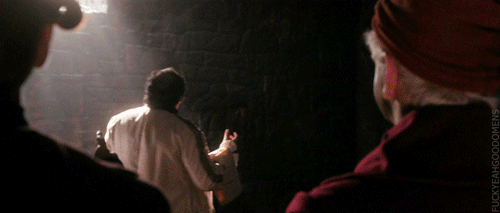
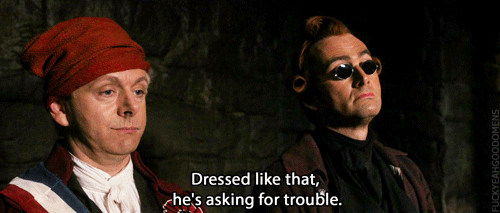
Crowley follows up here on earlier lines in which he teases Aziraphale for coming to Reign-of-Terror Paris for crepes: "Dressed like that?" meaning Aziraphale was guaranteed to get arrested dressed like an aristocrat. The top layer of equivocation is always an innocuous meaning: the plausible deniability meant for the hostile/unsafe listeners. That's Meaning 1.
But "Dressed like that, s/he's asking for trouble" means two other things, too. It's a veeerrrrry familiar phrase, isn't it? We've all heard that arrangement of words in that order before. It's used when people think someone (usually but not always a woman) is dressed to invite sexual attention.
How do we know we're supposed to take this modern meaning from this phrase? This is how:

We have learned in literally the previous sentence to this one that rain has not been invented yet. The only two humans in existence have just left the Garden. Balloons definitely not exist yet, and yet this is a phrase Crowley uses and Aziraphale understands. This tells us, the audience, in the very first line of the very first scene with these characters, that their speech is anachronistic and modern, and that we are to understand their phrasing in its contemporary sense.
So. When Crowley says "Dressed like that, he was asking for trouble" in 1793, we should read that in the context of the scene and in the senses the phrase carries to us today.
And since Crowley is using a phrase that means the executioner is dressed to invite sexual attention, and the executioner is wearing clothes identical to Aziraphale's, then Crowley is necessarily telling Aziraphale that when Aziraphale was wearing those clothes--those frilly, effete, unfashionable-for-decades clothes that nobody else likes and the French now murder people for wearing--that was, in Crowley's view...provocatively sexy. Meaning 2.
"Dressed like that, s/he was asking for trouble" is also what people say to justify violence, especially sexual violence against women and queerphobic attacks against men perceived as gay or just 'insufficiently' 'masculine'. In fact justifying assault is likely the most common way this phrase is used today by a wide margin. Meaning 3.
Crowley's joke isn't even really a joke in this sense; it's a vicious barb. And, because it must, it sounds like it's at Aziraphale's expense: You wore the wrong clothes, you weren't careful enough to guard yourself against the men who want to do you harm, so you deserved the trouble you got. Meaning 1.
Except remember: Crowley is also dressed for trouble. And Aziraphale is aware of this. Crowley's 'fit would be almost as offensive to the Revolutionary French of 1793 as Aziraphale's Rococo pastels, and probably just as likely to get him arrested and murdered by the state if he weren't making letting Aziraphale keep him safe by wearing the cockade and the silly hat. Crowley's not saying anything about Aziraphale here that he's not also saying about himself; and as we know from Aziraphale's initial "Oh good Lord" when he turns around and sees Crowley's black and red half-mourning (with extra black and gobs of silver), Aziraphale knows it.
Then why the rapey joke, Crowley?
This is fucking why:
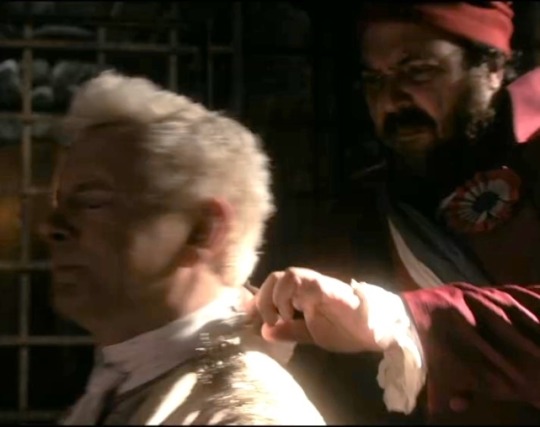
Crowley rocks up at the Bastille just in time to witness some grubby fucker assault his friend. Assault the person Crowley will greet 15 seconds after this as angel.
Crowley's first act after freeing Aziraphale is to send this dude to his death. Nope! Aziraphale is the one who arranges to have the executioner killed in the clothes he would have killed Aziraphale for wearing. He takes Jean-Claude's ability to speak (but not to make sounds, interestingly! Jean-Claude can still whimper, Jean-Claude can still cry!) so the executioner can't tell anyone about the 'mixup.' It's unclear which of them blocks the executioner's power of speech. The vicious joke about assault in Meaning 3 isn't at Aziraphale's expense at all. It's not You wore the wrong clothes, so you deserved the trouble you got. It's If this guy thinks you deserve trouble for wearing the wrong clothes, he can eat his own rules.
And that's the other piece of evidence that, along with Crowley's ensemble, shows us the audience and Aziraphale which meanings Crowley intends with his equivocation. Meaning 1 is cancelled out by Crowley's clothes. That leaves Meanings 2 and 3.
Crowley and Aziraphale share clothes as a common interest. They don't have the same style, but they're both aware of current fashions, and Heaven and Hell aren't. You can't tell me Hastur or Uriel would recognize the significance of Crowley saying "Dressed like that, he's asking for trouble" about someone else while wearing black stockings and cravat and waistcoat himself. And that means Anything the husbands communicate to each other through clothing choices goes undetected by their masters.
SO. With all this in mind, let's go through the 1793 scene again and look at what their clothes help them say without words.
Concluded in Part 2!
#good omens#good omens s2#good omens costumes#good omens fan theory#good omens meta#good omens analysis#ineffable husbands
571 notes
·
View notes
Text
Alright, not to be too predictable, but I wanna talk about space and color as it's used in the intro to episode 1 for a minute. And you know, show some gorgeous space shots.
So we open in the dark. There's distant lights and the occasional flare from them moving through space but for the most part we get the angel that would eventually become Crowley alone in enough darkness that he himself isn't even giving off particularly significant amounts of light.

But then, enter Aziraphale. He arrives in a big ball of blue light shining above him that really emphasizes Crowley's red hair. They get tied to the colors we most often see them attached to, especially in promotional materials.

From here the entire scene gets slightly brighter, even once Aziraphale's light dims down. They're both lit up once they're together, even it the middle of literal nothingness.
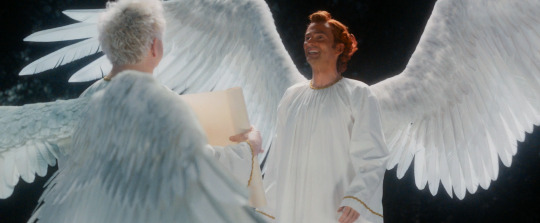
They start the universe next, using Crowley's hand crank, which gives off a magic that's a combination of their two colors - purple.
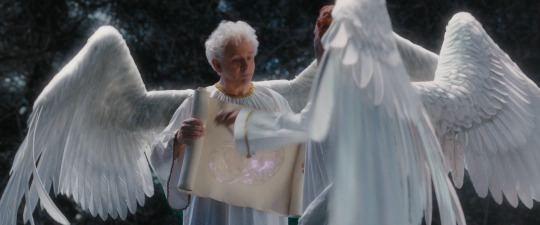
A very similar color to this shows up in heaven as a signal flare for their accidentally too powerful half a miracle. It's a color tied to a miracle so big it could've revived someone 25 times and also a miracle that got the engine of the universe running.

And then. Creation starts. Our first image is a very Heavenly aesthetic. It's a blueish light cutting through the clouds much like Az just cut through the dark.

And what explodes from that is the thing that set me down this little rabbit hole in the first place: it's purple scattered through with red and blue lights.

As the initial burst fades, the blue and the red separate, the color fading except for this tiny blue dot and this growing red zone on the right.

The blue then fades, leaving us with an extremely Crowley coded palette here and a very orangeish red. There's shades of gray, a little bit of light, but not nearly as much color. As the sequence moves the darkness grows but does start slowly filling with small points of light.


We then end up with shades of gray both light and dark. There's balance here, even if it's not particularly colorful.

And then all at once a pinkish red bursts forth with these intense clawing tendrils. At the core of it, from the heart of it, is a bright blue ball of light.

It fades into a blue heart surrounded by darkness with whisps of white resembling a certain someone's hair. Or, as some friends pointed out two people embracing.

As the nebula settles a few other colors set in but the primary scheme is still red and blue. An almost violent plume of red emerges on the left side of the image.

And from this moment on most shots of the two of them back them with their respective color schemes.

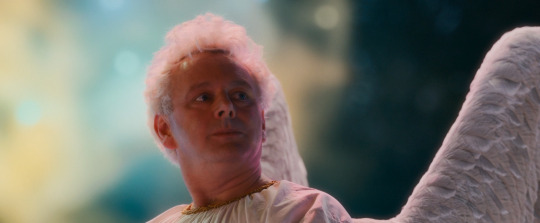

They chat and Aziraphale gets anxious. He looks for a distraction and is immediately drawn to the space where the colors mix.
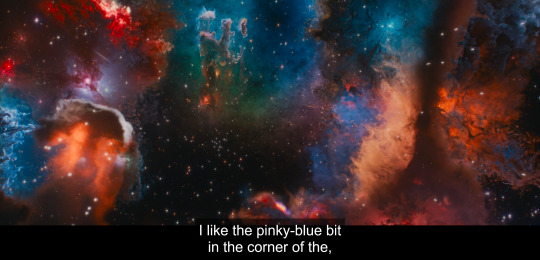
And as we fade out the other colors in the picture fade. We get the most balanced blue and red get. And on the far corners fairly clear dark and light.

So what does this mean? The purple speaks to them being very powerful together. And, the rest is arguably just representative of the plot. We have Aziraphale as a beacon in the dark - a signal flare we know Crowley has throughout history been aware of and drawn to. We have them brightening each other. We have Az's color breaking out of heaven to mix with Crowley's to create something new and wonderful and powerful. Aziraphale's color fades, leaving Crowley alone. We then get a burst of a red closer to Crowley's current hair, with Aziraphale's blue in the core of it that eventually becomes a blue heart surrounded by darkness. That too fades, replaced by the pillars becoming their familiar hand shape and slightly more colors seeping in. As they talk together and move closer together their own colors settle back in and come to balance.
3K notes
·
View notes
Text
Crowley nips in for a quick temptation...
Might be a bit basic, but I haven’t really seen this talked about explicity anywhere, and this is a Roman hill I’m willing to die on: Crowley (Crawly) 1000% knows that Aziraphale is at that bar in Rome (gonna throw in the quickly-googled term “popina” here?) when they meet 41 AD.
From the script, we know he’s in the middle of some soul-destroying work on the appalling Emperor Caligula and is in a terrible mood. Well, there’s one thing hanging around Rome that might cheer him up a bit, and there is no way in Hell™ he can resist the temptation of a bit of angelic cheeriness, no matter how much he (possibly) loathes himself for it. Crowley has masterminded this meeting despite all his snarky attitude.
Look at how he looks around to his right at the beginning of the scene (the sassy barmaid is right in front of him, not to his right):

Before being *massively surprised* when Aziraphale appears right there a moment later:


No fooling sassy barmaid. And the Angel is clearly game for acting as a bit of a pick-me-up/temptation.

(No way the work with Caligula would be a quick temptation.)

(Also, sure, might be reading into things way too much, but notice how the camera makes some unusually big, sudden cuts around the “Just nipped in for a quick temptation” line” here ^ , circling all the way from Aziraphale’s right to looking over his left shoulder in three big jumps. It’s almost like the camera slithers around Aziraphale/them both in classic Crowley-tempting-Aziraphale fashion, e.g. as seen in ˅ )

Crowley’s a skilled old tempter, and he knows juuuust how to play this game and get Aziraphale on the hook (not that Aziraphale is reluctant to take the bait):


My point? Dunno. Grumpy Crowley treats himself to some happy angel, giving in to his own temptation. Crowley fishes for the oyster invite and Aziraphale is VERY happy to bite. Aziraphale offers up some very nice oyster. Ergo, Crowley tempts himself, Crowley tempts Aziraphale, Aziraphale tempts Crowley. There’s like 18 layers of temptation in this scene and they are all delicious.
312 notes
·
View notes
Text
Crowley’s Roman Look is Very Strange

I didn’t. I didn’t want to be this person. But Aziraphale is sitting RIGHT THERE looking like A TOTALLY RESPECTABLE Roman citizen circa 40 AD. Maybe the hair might be unusual, but the Romans LOVED blonde hair. They thought it was cool and foreign and exotic in sort of a sexy way.
But Crowley is so historically confused. And I think the production design is too good and Neil Gaiman is too on top of his game for this to be accidental. It must mean something.
I - HAIR

What is on your head Crowley. Are you the emperor? Are you a victorious general currently participating in a victory parade?
Sure, you sometimes see laurel wreathes in portraits. But FUNERAL portraits.
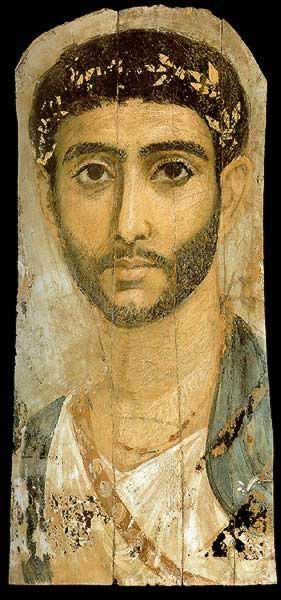
That crown is a symbolic thing, to celebrate your victories in life. It’s not STREET WEAR.
And okay. It’s 40-41 AD. Caligula is emperor. Military chic is in. If you’re a guy, you’re wearing your hair short and un-styled (LIKE AZIRAPHALE.) Those dramatic little spit curls wouldn’t show up until at least Nero.

But actually, pulling back for a second - are you appreciating the absurdity that is this hairstyle? Because it took me a second to notice that only the FRONT HALF is curled.
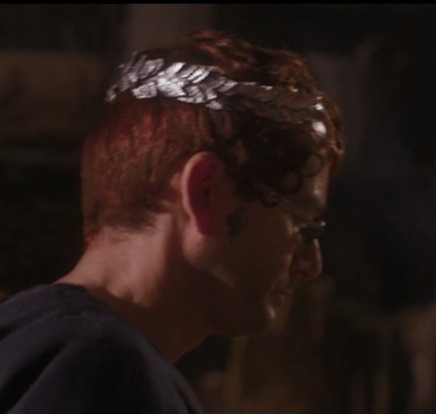
Which is a Roman hairstyle. But it’s a Roman LADY hairstyle.
(It tends to get called ‘Flavian Hair’ because the Flavian era ladies of the 70s-90s got pretty extreme about it, but you still had less… dramatic versions in the 40s.)
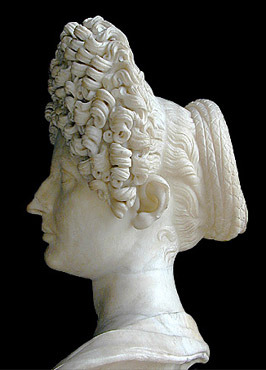
That’s you, Crowley. That’s your style reference. Honestly, if you had just kept your hair long everybody would have thought you were a cool barbarian chieftain or something.
II - CLOTHES
The black is fine. It’s eccentric, but fine. Romans wore black. Wearing black was Cato the Younger’s *thing.* It gets associated with mourning and/or protest, but it would have been really visually confusing to have Crowley wear some other color. This gets a pass.
Nope, my question is about his articles of clothing. There’s a charcoal grey garment that seems to be a toga + undershirt. It’s looped over Crowley’s arm, which is a classic toga give away.
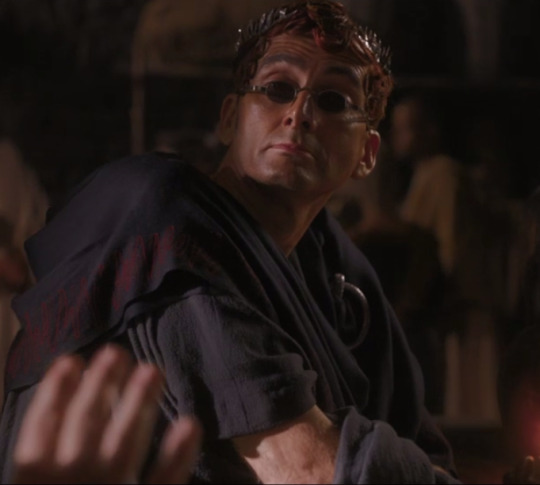
That part’s fine. But over the top, he’s wearing a true black… short cape? Shawl? it’s really hard to tell, because whatever it is, he is NOT wearing it correctly (is it folded in half?) Also, that irregular red zigzag pattern is very strange and I do not recognize it from anywhere. Seriously, I can’t even decide on a continent for this garment.
III - JEWELRY
Emperor Nero usually gets credit for inventing the first sunglasses, after he started watching gladiators fight though a green gemstone. He won’t be emperor for about ten years. But hey, he probably got the idea from somewhere. And dark glasses are just a really sensible way to hide your snakey eyes. This is also the first time we see Crowley put up some proper emotional barriers, so it’s a good place for the glasses to be introduced. (@theladyzephyr has a wonderful meta that goes into a lot more detail here.)
So the sunglasses are good. BUT THAT BROOCH.
Okay. This is Aziraphale wearing a fibula plate brooch

It’s a really Roman style, and a really Roman shape (a “pelta”)

I’ve never seen one that looks like angel wings, but a Roman citizen is going to look at that and see a soppily patriotic Imperial Eagle. How nice that this lovely man from Germania/Greece has made some money and become such an exemplary citizen!
But Crowley is wearing a penannular (pin-and-ring) brooch
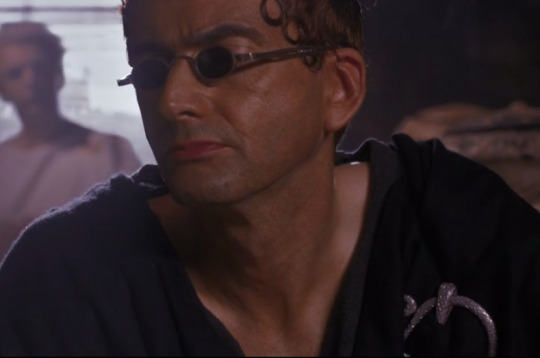
That’s not roman. That’s a style from the British Isles (Irish, Pictish, Scottish, Welsh.) It says barbarian, boonies, outskirts of the civilized world.
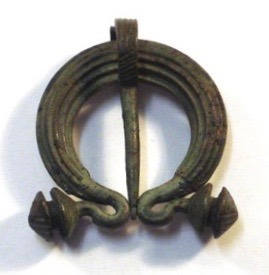
And nobody @ me with pictures of pin-and-ring brooches from Rome. Those are small, cheap, and undecorated. They’re the cultural equivalent of safety pins. This is patterned like a snake, and it’s the size of Crowley’s palm.

AND THAT’S ANOTHER THING. They didn’t do snake-themed jewelry in the British isles. Snakes didn’t have the best cultural associations there, and there weren’t too many of them there to begin with. This isn’t something Crowley picked up because “hey, a snake, cool,” and then got attached too. This must have been commissioned special.
But you know who LOVED snake jewelry?
ROMANS.

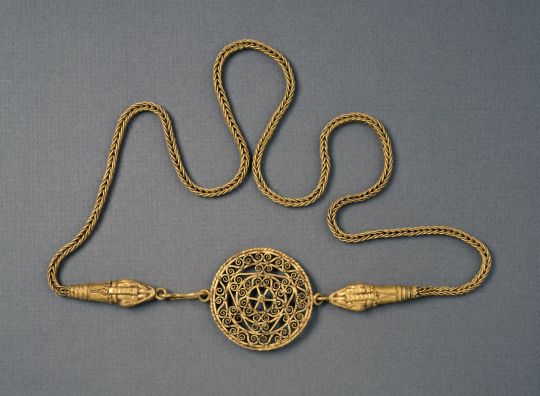
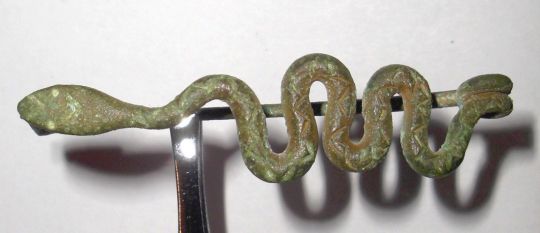
Romans associated snakes with healing and rebirth - clinics sometimes had lil snakes crawling around on the ground to give the place good vibes.
You cannot tell me that Crowley could have existed in Rome for any length of time and not picked up some of this jewelry. Which leads me to my conclusion:
IV - CROWLEY IS EXTREMELY NEW IN TOWN
The unfashionable pin and hair? The clothing draped the wrong way? The cultural colorblindness of wearing a laurel crown when you’re not supposed to? Crowley looks like a tacky tourist because he is one. He’s not staying here long, he “just nipped in for a quick temptation.”
He’s in a bad mod because he’s had an awful day, everyone keeps looking at him funny, the temptation was a complete bust, he has culture shock, and now he’s just trying to get a drink. But they don’t have any PROPER drinks like ALE or MEAD here, so he just orders “whatever’s drinkable.” He’s even not sure what they drink in Rome.
But then Aziraphale shows up and invites him to lunch some place fashionable. So everything’s going to be okay.
50K notes
·
View notes
Text
if i had a nickel for every time a gay show gave me a gay kiss before ruining my gay life…


id have two nickels. which isn’t alot but its FUCKING DEVASTATING THAT ITS HAPPENED TWICE
15K notes
·
View notes
Text
i’m so totally normal about the fact that aziraphale’s last (known) deliberate foray into the queer community was when he learned the gavotte at the fictionalized hundred guineas club (!!!) in the 1800s and now in the 2020s he’s like “grindr? what’s that?”
many are talking about his repression which is very valid… and yet the thing to me that stands out about aziraphale is that he’s actually… incredibly stable in his identity and that identity IS incredibly queer. queer by the standards of heaven AND by human standards as well
metatron describes his “de facto partnership” with crowley as “irregular.” and in fact aziraphale in his entirety is irregular. he likes and makes it his business not only to understand but to be a connoisseur of all manner of things angels aren’t supposed to even remotely care about. food. music. books. theatre. sleight of hand. and more.
it’s the sort of behavior that would’ve gotten him othered, treated as a bit odd, in heaven even if he hadn’t chosen to consort all across the earth with a literal demon. and it IS treated that way - the fact is aziraphale even as an angel has got proclivities that set him apart from the rest of the host (even after offering him the highest position in heaven, metatron still acts deeply dismissive of him… like aziraphale’s bookshop is merely a quaint little hobby of his that can be easily transferred to another custodian, and not a literal extension of who aziraphale has become, full of his tartan and unique bibles and special vintages of wine and the books arranged in a very specific way)
so. aziraphale is a queer angel but of course he’s also queer to other humans. but in such a way that… he had his realization a LONG time ago, and put the matter very much to rest after that. aziraphale is perpetually something like several centuries behind schedule. he owns an ancient computer that probably continues to run windows 98 simply because aziraphale’s decided it should. he wears the same waistcoat and coat for generations because he simply likes them precisely the way they are and sees no reason to change them. but the idea that he doesn’t know how he comes across to others - of course he does. he knows he looks like your prim and proper grandfather and he prefers it that way
aziraphale looked around at humans in the 1880s and said: ah yes. this is where i fit. and promptly ensconced himself in that queer subculture. learned the gavotte. read his austen. loved crowley from afar. aziraphale is fiercely and vibrantly queer. just with the sort of assurance of someone who lives with his lover in a commonlaw marriage for decades and then shows up at city hall for the certificate once society decides it’s ‘allowed.’ like… he hasn’t had any need to know what grindr is because aziraphale’s ‘scene’ was a century and a half ago and it defined romance for him too.
but my favorite thing about aziraphale is how much of him is about appearances versus the truth. he can lie straight to angels’ faces and sleep at night. he knows he comes off soft but he once wielded a flaming sword. he dissembles helplessness but he’s far from it and he knows precisely how it makes others treat him. and at the core of aziraphale is rigidity, inflexibility of ideas… his sense of self is stable where crowley’s is malleable, and so on, and so on
and the fact that he’s continuously fixated on trying to misguidedly do the right thing, the fact that he seeks heavenly approval and wants to fit the world into his schema of good vs evil… in no way do i think that means he isn’t one hundred percent aware of how he feels about crowley or what it means about him by angelic or human standards. i’ve seen some folks saying that aziraphale doesn’t want to like kissing crowley and like… as much as i love me some brideshead revisited/atonement flavored angst; i put forth that it’s not internalized homophobia or queer panic but simply: “i’m trying to do the right thing for both of us and you won’t let me.” and “i wanted our first kiss to be different.” he was envisioning an entirely different flavor of romance than what he got but he emma woodhoused too close to the sun
like, y’all. aziraphale in all likelihood has a glorious collection of historical queer erotica. he just has a feathery diva coat hanging in his closet, and for what. “oh, good lord” he says at crowley’s revolutionary outfit in the bastille, while eyeing him up like an entire meal. he’s so good at affected propriety, at carefully constructed stuffiness, but between the two of them aziraphale’s got to be the one who has experience
aziraphale had been physically throwing himself at crowley the entire season. he orchestrated an entire regency ball so they could touch hand to hand. he spends the entire season (well, and season 1) looking at crowley like he’s particularly coveted. he looked at crowley before the fall like he was glorious and beautiful. aziraphale’s queer and he knows it and i think that isn’t his problem, it’s the fact that he wants to build a different sort of future for the two of them but crowley’s gone and thrown a wrench in it by reminding him of everything he can finally have. like. that’s the heartbreak. it’s how dare you make this ugly? i forgive you for our first kiss being all pain and salt. it’s my dearest, i wanted to make heaven as beautiful as you deserve. as sacred and safe for us as our bookshop. and i can do that for us, because once i held a flaming sword and i still remember how the hilt felt in my hands. and now the taste of you is in my mouth.
7K notes
·
View notes
Photo

Happy birthday Janis Joplin!
Born on the 19th of January, 1943, Janis was one of the most well-known US musicians of the 1960s. She performed at Woodstock, and was most famous for her cover of Kris Kristofferson’s Me and Bobby McGee, which reached number 1 in the Billboard charts in the year after her death. Janis was bisexual, having relationships with men and women throughout her life.
[Image: Janis Joplin, a young, smiling woman wearing a tie-dye shirt with billowing sleeves, 1970]
131 notes
·
View notes
Text
Couldn’t agree more - before I even looked at the comment, it struck me how much Turin reads as autistic here. Beautiful description of an autistic child.

Obsessed with how this reads like if someone ran the dsm criteria for autism through a Tolkien translator
617 notes
·
View notes
Text
The Nameless Enemy: Speculations on My Favorite Baddie, Part 4
“It was an admirable thing and altogether precious.”

Gas cloud surrounding the star Fomalhaut.
go to part 1 | go to part 2 | go to part 3 | this is part 4 | go to part 5 [coming soon]
We never see Sauron—at least not in The Lord of the Rings—and that was funny to 13 year old me. When I first followed Frodo on that journey to Mount Doom I wondered at the choice to name a book after a villain who doesn’t actually appear in it. There’s the arrow of red light from Barad-dûr’s highest tower, of course, or the dark cloud with the reaching arm that rises over Mordor at the moment of Sauron’s defeat, but both of these function as suggestions of his presence or the weight of his attention only; they are the interpretations of the events as seen by others. Likewise, the one and only time Sauron speaks we receive his words through an intermediary—a contrite Pippin who has sneaked a peek at the palantir.
But Sauron is always there. The threat or the fear of him is always just at the edge of our peripheral vision: in the far-flung, millennia-long plots[1]; in the metaphors that put him everywhere all the time, disembodied limbs reaching to encompass all of Middle-earth (“his arm has grown long”) or disembodied eyes searching[2]; in the almost campy performance of evil on display when he orders his minions to steal only black horses from the Rohirrim; in the capitalized pronouns; in the metonymy and other evasive forms of address his orc underlings use to circumnavigate invoking him. In poor Sméagol’s other self[3].
In the ever-increasing weight hanging from Frodo’s neck: our antagonist is on that journey, too, literally and figuratively barreling towards his own destruction.
Along that journey Tolkien tells us numerous names and epithets for him—103 according to Richard Blackwelder’s A Tolkien Thesaurus—not counting the many he goes by in other texts. One of those is “The Nameless Enemy.” This word—“nameless”—is first applied in this way by Boromir at The Council of Elrond and later by Faramir, suggesting that invoking the name “Sauron” may be considered dangerous or even taboo to the Men of Gondor.
But “nameless” is far more appropriate than this simple explanation can express.
Keep reading
107 notes
·
View notes